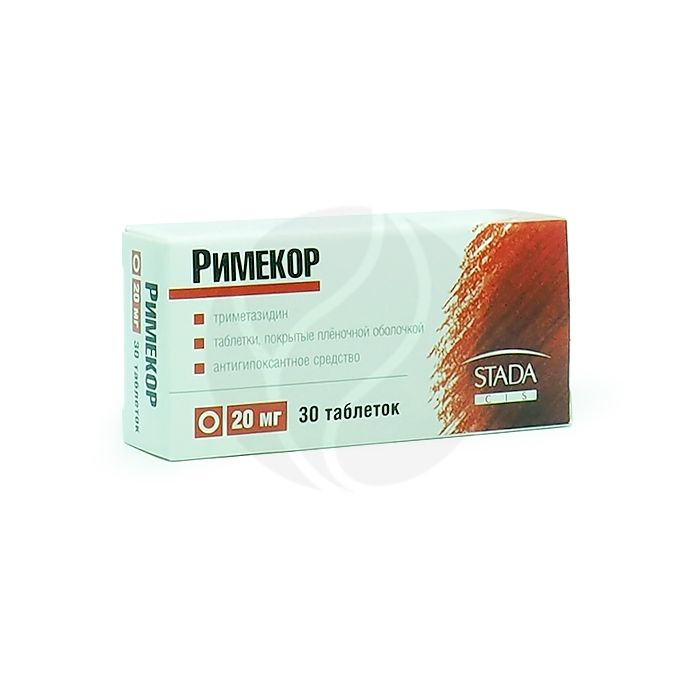Rimecor tablets p / o 20mg, No. 30
Expiration Date: 05/2027
Russian Pharmacy name:
Римекор таблетки п/о 20мг, №30
IHD: prevention of angina attacks (as part of complex therapy);
chorioretinal vascular disorders;
dizziness of vascular origin;
cochleo-vestibular disorders of an ischemic nature (tinnitus, hearing impairment).
The drug is taken orally during meals.
The recommended dose is 40-60 mg / day (2-3 tablets) in 2-3 doses. The duration of the course of therapy is determined individually.
Trimetazidine dihydrochloride
renal failure (CC <15 ml / min);
severe liver dysfunction;
pregnancy;
lactation period (breastfeeding);
children and adolescents under 18 years of age (efficacy and safety have not been established);
hypersensitivity to the components of the drug.
Clinical and pharmacological group: A drug that improves the metabolism of the myocardium and neurosensory organs in ischemic conditions
Pharmaco-therapeutic group: Antihypoxic agent
pharmachologic effect
A drug that improves the metabolism of the myocardium and neurosensory organs in ischemic conditions. Has antianginal, antihypoxic effect. By directly affecting the cardiomyocytes and neurons of the brain, it optimizes their metabolism and function. The cytoprotective effect is due to an increase in energy potential, activation of oxidative decarboxylation and rationalization of oxygen consumption (increased aerobic glycolysis and blockade of fatty acid oxidation). Supports myocardial contractility, prevents a decrease in the intracellular content of ATP and phosphocreatine.
Under conditions of acidosis, it normalizes the functioning of membrane ion channels, prevents the accumulation of calcium and sodium in cardiomyocytes, and normalizes the intracellular content of potassium ions. Reduces intracellular acidosis and phosphate levels caused by myocardial ischemia and reperfusion. It prevents the damaging action of free radicals, preserves the integrity of cell membranes, prevents the activation of neutrophils in the ischemic zone, increases the duration of the electric potential, reduces the release of CPK from cells and the severity of ischemic damage to the myocardium.
With angina pectoris, it reduces the frequency of attacks. At the same time, the consumption of nitrates decreases, after 2 weeks of treatment, exercise tolerance increases, and blood pressure drops decrease. Against the background of the use of the drug in patients, hearing and the results of vestibular tests improve, dizziness and tinnitus decrease.
With vascular pathology of the eyes against the background of the use of the drug, the functional activity of the retina is restored.
Pharmacokinetics
Suction
After taking the drug inside, trimetazidine is rapidly and almost completely absorbed from the gastrointestinal tract. Bioavailability is 90%. The time to reach Cmax in blood plasma is 2 hours. After a single dose of trimetazidine at a dose of 20 mg, Cmax in blood plasma is about 55 ng / ml.
Distribution
Plasma protein binding - 16%. Easily penetrates histohematogenous barriers.
Withdrawal
T1 / 2 is 4.5-5 hours. It is excreted from the body by the kidneys (about 60% - unchanged).
Indications
IHD: prevention of angina attacks (as part of complex therapy);
chorioretinal vascular disorders;
dizziness of vascular origin;
cochleo-vestibular disorders of an ischemic nature (tinnitus, hearing impairment).
Dosage regimen
The drug is taken orally during meals.
The recommended dose is 40-60 mg / day (2-3 tablets) in 2-3 doses. The duration of the course of therapy is determined individually.
Side effect
From the digestive system: rarely - gastralgia, nausea, vomiting.
Allergic reactions: itchy skin.
Others: rarely - headache, palpitations.
Contraindications for use
renal failure (CC <15 ml / min);
severe liver dysfunction;
pregnancy;
lactation period (breastfeeding);
children and adolescents under 18 years of age (efficacy and safety have not been established);
hypersensitivity to the components of the drug.
Application during pregnancy and lactation
The drug is contraindicated for use during pregnancy and lactation (breastfeeding).
Application for violations of liver function
The drug is contraindicated for use in severe liver dysfunction.
Application for impaired renal function
The drug is contraindicated for use in renal failure (CC <15 ml / min).
special instructions
The drug is not intended to relieve angina attacks.
Against the background of drug treatment in patients with coronary artery disease, there is a significant decrease in the daily requirement for nitrates.
Influence on the ability to drive vehicles and use mechanisms
The use of the drug does not affect the ability to engage in potentially hazardous activities that require increased attention and high speed of psychomotor reactions.
Overdose
Currently, no cases of Rimecor drug overdose have been reported.
Drug interactions
The drug interaction of the drug Rimecor is not described.
Storage conditions
List B. The drug should be stored in a dry, dark place, out of the reach of children, at a temperature not exceeding 25 ? C.
Shelf life
Shelf life is 3 years.
Terms of sale
The drug is available with a prescription.

